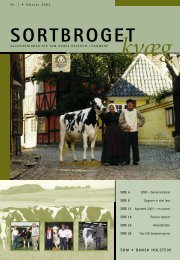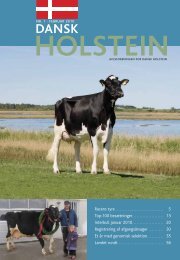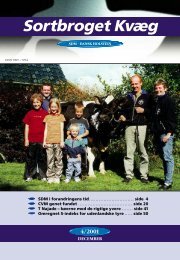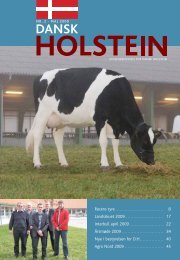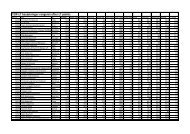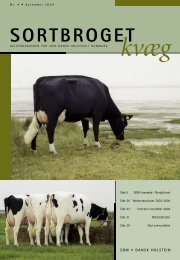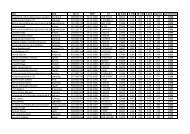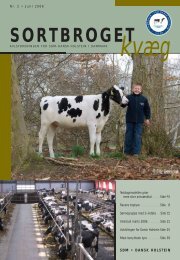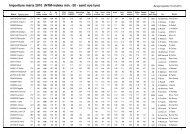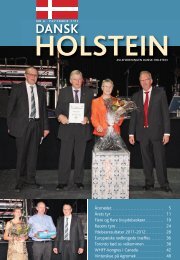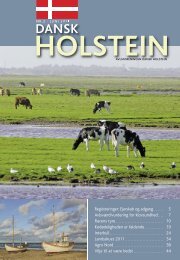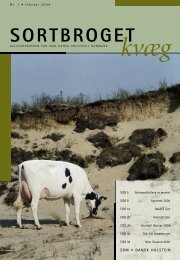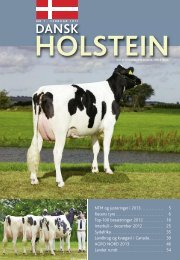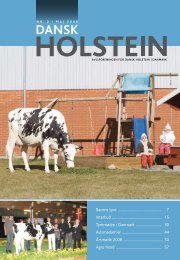SESSION 3: IMPROVING REPRODUCTIONUSING NEW TECHNOLOGIESPotential Market Value of Reproductive TechnologiesSVEN KÖNIG (GERMANY)Doctor Sven König is a Professor of Animal Breeding at the Universityof Kassel in Kassel, Germany. While completing his PhD at theInstitute of Animal Breeding and Genetics, University of Göttingen,he was an employee at the dairy cattle co-operation, TopQ’. Inaddition to his work as a Professor, König’s current research includesanalyses of SNP-data (Imputation, estimation of genomic breedingvalues, population genomics) and evaluation of genomic breedingprograms with a focus on dairy cattle. Prior to becoming a Professor,he was the Head of the group Biometrics and Agricultural ComputerSciences at the Department of Animal Sciences at the University ofGöttingen and also was a visiting researcher at the Department ofAnimal and Poultry Science, at the University of Guelph in Guelph,Ontario, Canada with Professor Larry Schaeffer.Ranking of sires in national or international top-lists strongly determines their market value, and consequently,competiveness of dairy cattle breeding programs. In the past and in the future, reproductive technologies have beenand will be applied with a focus on increasing both genetic gain per year and associated economic evaluation criteria.From this perspective, the current paper evaluates the impact of artificial insemination, embryo transfer, ovum pickup and in vitro fertilization, sperm sexing, and cloning. Results from real data analyses (retrospective analyses) aswell as from model calculations are used to compare various breeding program scenarios. The evaluation not onlyincludes the prospects of reproductive technologies, but also associated risks. In the case of artificial insemination,one favorable opportunity is semen transfer without regional and temporal limitations, also enabling multiple acrosscountry evaluations. The undesired side-effect is the strong focus on just a few, influential sires in breeding programsworldwide, resulting in an increase of inbreeding and genetic relationships. Also, to cite another example, adultcloning enables the creation of identical copies of influential bull sires or show cows increasing their market value in theshort term, but cloning will decrease selection response in the long-term perspective due to the substantial reductionof genetic variance. Finally, reproductive technologies will be discussed in the context of molecular biotechnologyapplications. For the success of marker assisted selection in bottom up or top down designs, the increase of femalereproductivity via embryo transfer was imperative, but genomic selection reveals greater flexibility.18
SESSION 3: IMPROVING REPRODUCTIONUSING NEW TECHNOLOGIESAdvancement in Natural Heat DetectionCLAIRE PONSART (FRANCE)Claire Ponsart’s area of research concerns animal breeding andartificial v insemination. After being qualified as a veterinarian,her PhD thesis was dedicated to the use of flushing as a meansto improve cyclicity resumption in beef cattle. She joined France’sUNCEIA Research and Development department in 1998 with theresponsibility of leading projects related to embryo production incattle. In 2002, she was chosen to implement new practical tools inFrench breeding companies, aiming to improve fertility within theUNCEIA Research and Development project called “Fertility at First”.Thus, a special interest of Claire’s is reproduction management,specifically looking at ways to achieve fertility improvement togetherwith genetic selection. Since 2010, Claire is the scientific director atthe National Union of French AI and Breeding Companies and has extensive collaborations with researchgroups both in France and in other countries around the world.Ovulation detection is a key step in reproduction management, as it determines the decision of insemination. Withoutpossibility of progesterone monitoring, observation of changes in animal’s behavior during heat remains the classicalway for breeders to predict the ovulation time and adjust the timing of AI. However, heat expression shows variationboth in intensity, in duration and by the moment when signs occur. In the <strong>Holstein</strong> breed, cows’ heats are nowadaysboth more discreet and shorter than before, especially in high producing cows. The heat expression will be poor inherds with a high level of milk production, different calving periods and reproduction in housing. Consequently,heat detection thus entails a focussed attention and the use of all sexual signs. Increasing the sensibility of detectiondecreases the specificity, thereby increasing the frequency of AI performed at the wrong moment. A new methodcalled “DETOESTRUS” has been developed to assess the accuracy of heat detection in a dairy herd. This approachis innovative because it allows to distinguish problems associated with cows (delayed resumption of postpartumcyclicity, low estrous expression), to those related to breeder’s practices (defect in sensitivity or specificity detection),and so to provide targeted solutions based on farmer’s objectives and constraints. The dairy version includes anestimate of the sensitivity and specificity detection by prediction equations using data easily available in the breedingdocuments and considering estrous expression level of the cows.19For breeders who are not able to spend enough time in females’ observation, monitored heat detection aids have beenrecently developed to improve heat detection rates while sparing farmer’s time. Today, technical performances of thesedetectors posted by manufacturers show that these monitoring tools allow quite high detection rates (70-80 %) witha good accuracy (often above 90 %). Nevertheless, some recent scientific experiments show that the efficiency of heatdetection systems is highly variable according to the different automated devices, the characteristics of monitoredanimals and environmental conditions (housing, breeding management…). Considering that an initial investment isrequired to implement automated heat detection devices, the question of their cost / advantage ratio still remains tobe assessed according to the production system’s objectives.



